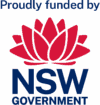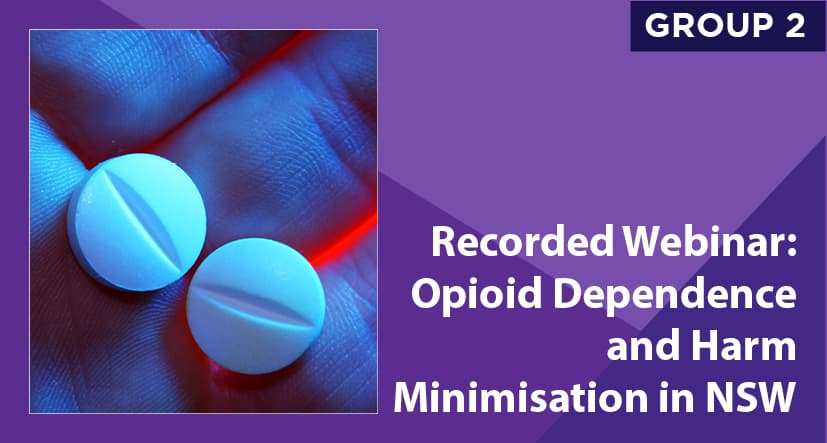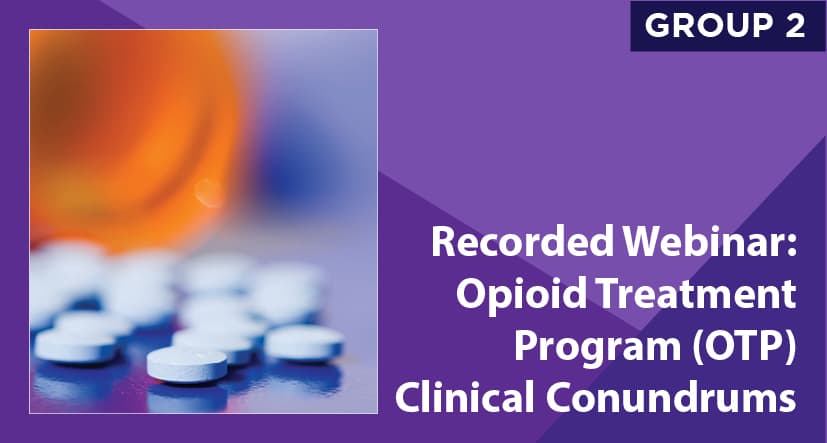NSW Opioid Treatment Program (OTP) – Foundation Training and Support
Be at the forefront of Opioid Treatment Program (OTP) service delivery in NSW
Jump to:
- Opioid Treatment Program (OTP) – Providing a high-quality, valued service
- Long-Acting Injectable Buprenorphine (LAIB) for a full scope of practice
- Take Home Naloxone (THN) – saving lives with an essential medicine
- Delivering non-judgemental care for people who use or have used alcohol and other drugs
Hear from PSA National President, A/Prof Fei Sim on the training, resources and support PSA is offering for pharmacists to deliver a safe, legally compliant and person-centred OTP service.
Opioid Dependence Treatment (ODT) aims to reduce the harms related to opioid use in the community, including the social, economic and health impacts. Community pharmacy plays a critical role in ODT, providing 85% of dosing sites nationally for people seeking treatment for opioid dependence.
In NSW, pharmacists can provide treatment for methadone, sublingual buprenorphine as well as administer long-acting injectable buprenorphine.
PSA is proud to offer education to support pharmacists in this critical area, equipping them with the knowledge and skills necessary to provide high-quality care when delivering the OTP.
What’s in it for you?
All training and resources offered by PSA on the NSW OTP:
- are FREE for all pharmacists in NSW
- have all you need to know about delivering an OTP service
- help you establish your pharmacy to support patients with an opioid dependence
- enable you to play a key role in reducing the health, social and economic harms to individuals and the community.
Opioid Treatment Program (OTP) - Providing a high-quality, valued service
In this video, you will hear from John Jones, community pharmacist and pharmacy owner, as well as Pam, a person with lived experience of accessing OTP, on why the service is so important for them.
Free NSW OTP: Foundation training course for pharmacists, CPD-accredited
Want to learn more about the NSW OTP?
Enrol in our free NSW OTP: Foundation training course for pharmacists, which provides comprehensive training for pharmacists to develop the relevant knowledge, skills and tools required to deliver a safe, legally compliant and person-centred OTP service. You do not have to be a PSA member to access this training.
These modules are highly recommended for anyone new to providing OTP services, as well as for those already delivering them. They will update your knowledge, provide up to date clinical information and help you to maintain competence to deliver the OTP service.
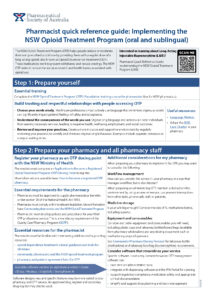
Implementing the NSW OTP in your pharmacy
Download our Pharmacist quick reference guide: Implementing the NSW Opioid Treatment Program (oral and sublingual) for the essential information, steps, and responsibilities for pharmacists to deliver this service in your pharmacy.
Free Webinars: Hear from experts to build your knowledge, CPD-accredited
PSA is delivering a series of webinars to support pharmacists to deliver the Opioid Treatment Program in NSW. Access them here:
Recorded Webinar: Opioid Dependence and Harm Minimisation in NSW. Hear from Dr Hester Wilson and Dr Jack Collins on how to provide high-quality, person-centred opioid dependence and harm minimisation services in NSW community pharmacies.
Recorded Webinar: Opioid Treatment Program (OTP) Clinical Conundrums. Hear from our panel of pharmacists, a prescriber and a person with lived experience on how pharmacists can navigate real life scenarios and provide solutions for common OTP conundrums.
Long-Acting Injectable Buprenorphine (LAIB) for a full scope of practice
Pharmacists in NSW may administer LAIB if it is within their scope of practice and professional competency.
In this video, you will hear from John Jones, as well as Luke, a person with lived experience of accessing LAIB, on how it can be a lifesaving treatment.
Free NSW LAIB administration by pharmacist course, CPD-accredited
Want to learn more about LAIB in NSW?
Enrol in our free NSW long-acting injectable buprenorphine administration by pharmacists course, which enables pharmacists to acquire the relevant knowledge and skills to administer long-acting injectable buprenorphine in a safe and person-focused environment. You do not have to be a PSA member to access this training.
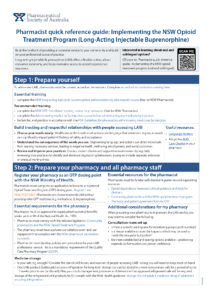
Implementing LAIB in your pharmacy
Download our Pharmacist quick reference guide: Implementing the NSW Opioid Treatment Program (Long-Acting Injectable Buprenorphine) for the essential information, steps, and responsibilities for pharmacists to deliver this service in your pharmacy.
Take Home Naloxone (THN) – saving lives with an essential medicine
Take Home Naloxone is a lifesaving medicine to reverse opioid overdose, easily administered via a pre-filled syringe for injection or an intranasal spray.
Opioid overdose is a major cause of harm and death in Australia, implicated in 60% of drug-induced deaths in 2020.
Watch and listen to Matthew’s Story, who has lived experience using naloxone and how it saves lives.
Pharmacists have a critical role, as the most accessible health professionals in Australia, to save lives through the provision of Take-Home Naloxone.
Listen to Lily Pham, who outlines how pharmacists can optimise their THN Service.
How community pharmacists can get involved
1. Find out how the National Take Home Naloxone Program works.
3. Order naloxone through your usual ordering channel and promote its availability among staff and people coming to your pharmacy.
4. Identify eligible people who would benefit from Take Home Naloxone, including:
-
- People taking high-dose prescription opioids for chronic pain. Refer to the Opioid Toolkit for more information.
- People who use any illicit drugs including opioids or stimulants, including occasional and recreational use.
- Anyone who’s friends and family use illicit drugs or who are prescribed opioids
- First aid trained workers, to carry with them in case they witness an overdose at work.
5. Supply naloxone to eligible patients with advice on how to use naloxone.
Refer to the consumer information sheet provided with Nyxoid® or Prenoxad®.
6. Collect simple de-identified patient data.
7. Claim reimbursement through the PPA portal and enter patient data.
8. Re-order naloxone to ensure adequate replacement stock.
Reference: NSW Health, Take home naloxone program, available at: https://www.health.nsw.gov.au/aod/programs/Pages/naloxone.aspx
Delivering non-judgemental care for people who use or have used alcohol and other drugs
Delivering care in the pharmacy that is safe, accessible, equitable and non-judgemental is essential to reduce stigma.
Stigma in the form of language and actions can make people who use, or have used alcohol and other drugs, feel unwelcome and unsafe. This can stop them from seeking the services they need, which can negatively impact their health, wellbeing, employment and social outcomes.
Watch below to see Jade’s experiences, both positive and negative with community pharmacy, as well as how Emerton Amcal Pharmacy provides non-judgemental care:
Free, CPD accredited online module to enhance your care
Enrol in our Enhancing Care for People Who Use Alcohol and Other Drugs (AOD) in Pharmacy online module to gain deeper understanding of how stigmatising practices impact those accessing AOD services in community pharmacy. You’ll also explore practical, evidence-based strategies to create a more inclusive and supportive environment, helping to break down barriers and foster engagement with these life-saving programs.
See below for further resources on how to deliver non-judgemental care in your pharmacy:
- Language Matters provides pharmacists and pharmacy staff with best-practice guidelines on how to use language to empower clients and reinforce a person-centred approach.
- Adopt the AOD Care Charter alongside your Community Pharmacy Service Charter. The AOD Care Charter aims to improve the experiences and health outcomes of people who use or have used alcohol and other drugs.
Acknowledgement
PSA acknowledges the partnership and funding of NSW Health
